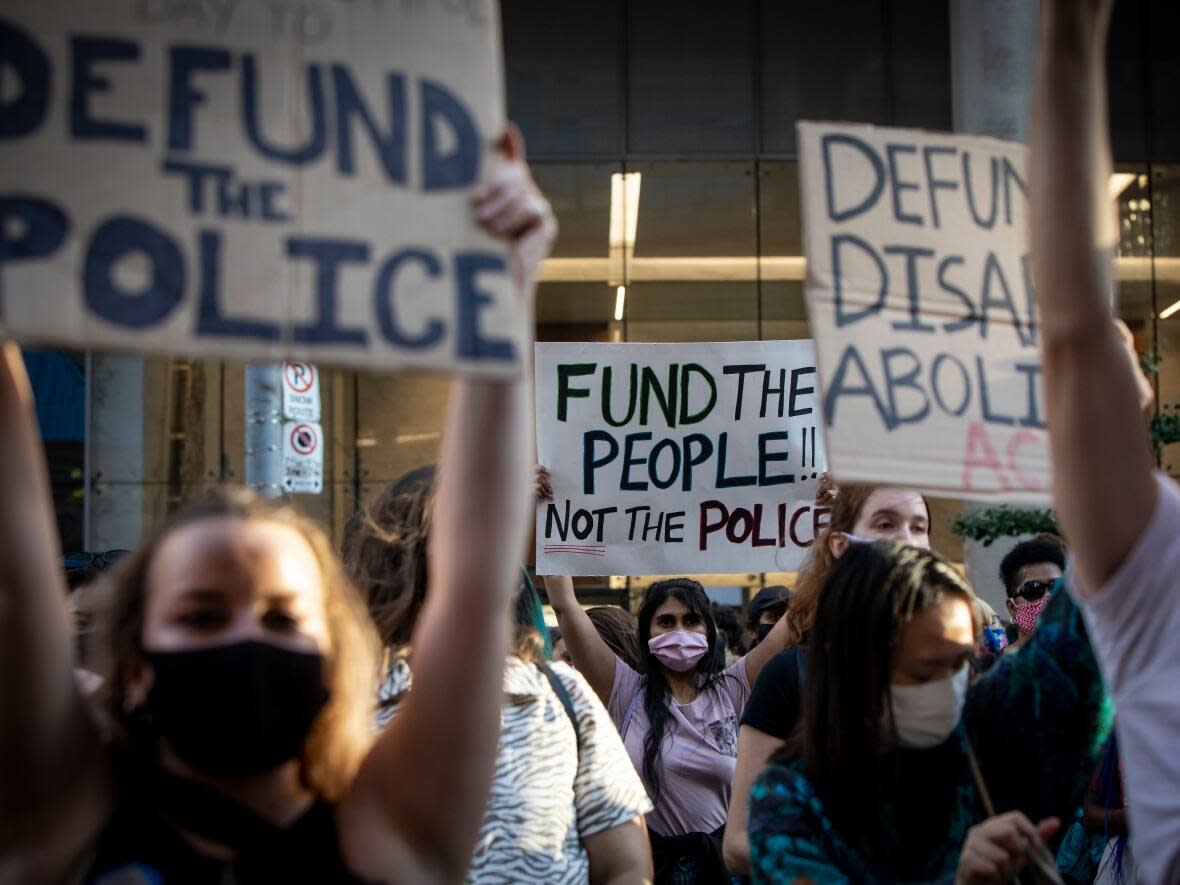Committee tasked with defining 'defunding police' releases final report

A committee created to define what it means to defund the police has released its final report, touting widespread reforms to Halifax Regional Police practices, oversight and accountability.
The work of the committee, created by the Halifax Board of Police Commissioners in August 2020, is the culmination of an extensive public consultation process and research by committee members and its support team.
Committee chairperson El Jones, a well-known community activist and educator, said the 219-page report is just the beginning of what she hopes will be ongoing public engagement in reforming policing in Nova Scotia's capital and beyond.
"It's not the last word. It's certainly not a final stopping place," Jones told CBC Radio's Mainstreet on Friday.
"We believe we have started up a very important process that is allowing communities, service providers, representatives of the police and government to really engage seriously, not even necessarily with the idea of defunding police, but the broader conversation around public safety, prevention and what makes our communities livable and healthy."

The report's findings and 36 recommendations were presented to the Board of Police Commissioners on Monday. The board accepted the report and thanked the committee for its service.
Coun. Lisa Blackburn said she would bring forward a motion at the next board meeting to strike a subcommittee to examine the recommendations and develop a work plan.
"This is just the beginning of the conversation," said Blackburn.
The report is organized around four key pillars:
Reforms to police practices, oversight and accountability.
Reforms aimed at "detasking" police and "retasking" more appropriate community service providers.
Legislative, regulatory and policy reforms intended to promote community safety.
Financial reforms aimed at tying police budgets to clear performance metrics and encouraging public participation in municipal budgeting.
The report recommends the police board conduct research and consult community members on disarming certain officers, such as community response officers, and generally minimizing the use of firearms by police.
It asks the board to direct Halifax Regional Police and RCMP to make their policies and procedures publicly available online, as well as any standing orders or other directives that have superseded policies that are out of date.
The report also recommends revising the mental health mobile crisis team model to ensure that such calls are generally diverted to civilian-only teams.
Jones said during the public consultations, even members of the public who were against defunding the police agreed that police involvement in mental health calls is problematic.
Committee found 'shared concerns'
She said it was also a sentiment expressed during engagements with the National Police Federation, the union that represents the RCMP.
"We discovered that even though of course they strongly oppose defunding ... they do believe that many tasks are being downloaded onto the police they are not equipped to do," Jones said.
"So we did see there are shared concerns in detasking and retasking the police, which is one of the drivers of this report."
The document also said the board should reject any additional funding requests in relation to body-worn cameras from Halifax Regional Police and RCMP.
No dollar amount suggested
The report does not suggest a specific amount of money to cut from the police budget. Jones said that was not possible without more data from the police and municipality.
"We would also have needed a fuller consultation with service providers, which was not a realistic option given our limited mandate and pressures on service providers from the pandemic," she said in a news release.
"We also see the reallocation of municipal funds happening through participatory budgeting, and we didn't want to take away from the community's role."
Jones also said she hopes the report helps to remove negative connotations with defunding police.
Including community members
She said the concept is not just about removing funds from police, but also engaging the public in participatory budgeting, in which community members decide how to spend public funds.
"Perhaps more proactively, we can think about the movement of defunding, actively thinking about where we spend money and engaging the community in collective processes," said Jones, adding the committee found people in jurisdictions with participatory budgeting often feel more engaged and connected to their communities.
Jones said the committee believes many of the recommendations are practical and can be implemented quickly.
The public consultation process included a survey with 2,351 unique responses. It showed 56.8 per cent of respondents expressed support for the idea of defunding the police, while 43.2 per cent did not.
Support for defunding was higher among women and gender diverse people than among men.
MORE TOP STORIES


